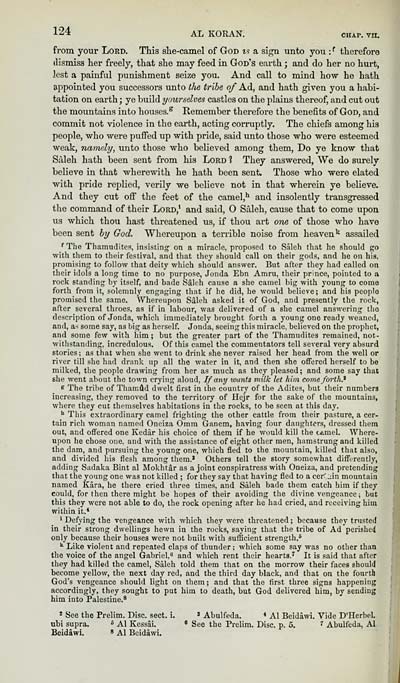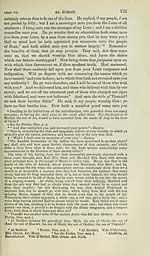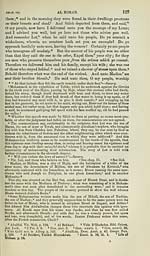Download files
Complete book:
Individual page:
Thumbnail gallery: Grid view | List view

124 AL KORAN. CHAP. vn.
from your Lord. This she-camel of God t? a sign unto you : ^ therefore
dismiss her freely, that she may feed in God's earth ; and do her no huii.,
lest a painful punishment seize you. And call to mind how he hath
appointed you successors unto the tribe of Ad, and hath given you a hahi-
tation on earth ; ye build yourselves castles on the plains thereof, and cut out
the mountains into houses.^ Remember therefore the benefits of God, and
commit not violence in the earth, acting corruptly. The chiefs among his
people, who were pufied up with pride, said unto those who were esteemed
weak, namely, unto those who believed among them, Do ye know that
Srdeh hath been sent from his Lord ? They answered. We do siirely
believe in that wherewith he hath been sent. Those who were elated
with pride replied, verily we believe not in that wherein ye believe.
And they cut off the feet of the camel,*^ and insolently transgressed
the command of their Lord,' and said, O Silleh, cause that to come upon
us which thou hast threatened us, if thou art one of those who have
been sent hy God. "Whereupon a tenible noise from heaven^ assailed
'The Thamuditcs, insisting on a miracle, proposed to Saleh that he should go
with them to their festival, and that they should call on their gods, and he on his,
promising to follow that deity which should answer. But after they had called on
their idols a long time to no purpose, Jonda Ebn Amru, their prince, pointed to a
rock standing by itself, and bade Sak'h cause a she camel big with young to come
forth from it, solemnly engaging that if he did, he would believe; and his people
promised the same. Whereupon Saleh asked it of God, and presently the rock,
after several throes, as if in labour, was delivered of a she camel answering the
description of Jonda, which immediately brought forth a young one ready weaned,
and, as some say, as big as herself. Jonda, seeing this miracle, believed on the prophet,
and some few with him ; but the greater part of the Thamudites remained, not-
withstanding, incredulous. Of this camel the commentators tell several very absurd
stories; as that when she went to drink she never raised her head from the well or
river till she had drank up all the water in it, and then she offered herself to be
milked, the people drawing from her as much as they pleased; and some say that
she went about the town crying aloud, 1/ any wants milk let him come forth*
s The tribe of Thamfld dwelt first in the country of the Adites, but their numbers
increasing, they removed to the territory of Hejr for the sake of the mountains,
where they cut themselves habitations in the rocks, to be seen at this day.
^ This extraordinary camel frighting the other cattle from their pasture, a cer-
tain rich woman named Onciza Omm Ganem, having four daughters, dressed them
out, and offered one Kedar his choice of them if he would kill the ctmel. Where-
upon he chose one, and with the assistance of eight other men, hamstrung and killed
the dam, and pursuing the young one, which fled to the mountain, killed that also,
and divided his flesh among them.' Others tell the story somewhat diff"erently,
adding Sadaka Bint al Mokhtar as a joint conspiratress with Oneiza, and pretending
that the young one was not killed ; for they say that having fled to a cer^ ain mountain
named Kara, he there cried three times, and Saleh bade them catch him if they
could, for then there might be hopes of their avoiding the divine vengeance ; but
this they were not able to do, the rock opening after he had cried, and receiving him
within it.*
' Defying the vengeance with which they were threatened ; because they trusted
in their strong dwellings hewn in the rocks, saying that the tribe of Ad perished
only because their houses were not built with sufficient strength.*
I' Like violent and repeated claps of thunder; which some say was no other than
the voice of the angel Gabriel," and which rent their hearts.^ It is said that after
they had killed the camel, Saleh told them that on the morrow their faces should
become yellow, the next day red, and the third day black, and that on the fourth
God's vengeance should light on them; and that the first three signs happening
accordingly, they sought to put him to death, but God delivered him, by sending
him into Palestine.^
* See the Prelim. Disc. sect. i. ' Abulfeda. * Al Beidawi. Vide D'HerbeL
ubi supra. * Al Kessai. ^ See the Prelim. Disc. p. 5. ^ Abulfeda, Al
Beidawi. ' Al Beidawi.
from your Lord. This she-camel of God t? a sign unto you : ^ therefore
dismiss her freely, that she may feed in God's earth ; and do her no huii.,
lest a painful punishment seize you. And call to mind how he hath
appointed you successors unto the tribe of Ad, and hath given you a hahi-
tation on earth ; ye build yourselves castles on the plains thereof, and cut out
the mountains into houses.^ Remember therefore the benefits of God, and
commit not violence in the earth, acting corruptly. The chiefs among his
people, who were pufied up with pride, said unto those who were esteemed
weak, namely, unto those who believed among them, Do ye know that
Srdeh hath been sent from his Lord ? They answered. We do siirely
believe in that wherewith he hath been sent. Those who were elated
with pride replied, verily we believe not in that wherein ye believe.
And they cut off the feet of the camel,*^ and insolently transgressed
the command of their Lord,' and said, O Silleh, cause that to come upon
us which thou hast threatened us, if thou art one of those who have
been sent hy God. "Whereupon a tenible noise from heaven^ assailed
'The Thamuditcs, insisting on a miracle, proposed to Saleh that he should go
with them to their festival, and that they should call on their gods, and he on his,
promising to follow that deity which should answer. But after they had called on
their idols a long time to no purpose, Jonda Ebn Amru, their prince, pointed to a
rock standing by itself, and bade Sak'h cause a she camel big with young to come
forth from it, solemnly engaging that if he did, he would believe; and his people
promised the same. Whereupon Saleh asked it of God, and presently the rock,
after several throes, as if in labour, was delivered of a she camel answering the
description of Jonda, which immediately brought forth a young one ready weaned,
and, as some say, as big as herself. Jonda, seeing this miracle, believed on the prophet,
and some few with him ; but the greater part of the Thamudites remained, not-
withstanding, incredulous. Of this camel the commentators tell several very absurd
stories; as that when she went to drink she never raised her head from the well or
river till she had drank up all the water in it, and then she offered herself to be
milked, the people drawing from her as much as they pleased; and some say that
she went about the town crying aloud, 1/ any wants milk let him come forth*
s The tribe of Thamfld dwelt first in the country of the Adites, but their numbers
increasing, they removed to the territory of Hejr for the sake of the mountains,
where they cut themselves habitations in the rocks, to be seen at this day.
^ This extraordinary camel frighting the other cattle from their pasture, a cer-
tain rich woman named Onciza Omm Ganem, having four daughters, dressed them
out, and offered one Kedar his choice of them if he would kill the ctmel. Where-
upon he chose one, and with the assistance of eight other men, hamstrung and killed
the dam, and pursuing the young one, which fled to the mountain, killed that also,
and divided his flesh among them.' Others tell the story somewhat diff"erently,
adding Sadaka Bint al Mokhtar as a joint conspiratress with Oneiza, and pretending
that the young one was not killed ; for they say that having fled to a cer^ ain mountain
named Kara, he there cried three times, and Saleh bade them catch him if they
could, for then there might be hopes of their avoiding the divine vengeance ; but
this they were not able to do, the rock opening after he had cried, and receiving him
within it.*
' Defying the vengeance with which they were threatened ; because they trusted
in their strong dwellings hewn in the rocks, saying that the tribe of Ad perished
only because their houses were not built with sufficient strength.*
I' Like violent and repeated claps of thunder; which some say was no other than
the voice of the angel Gabriel," and which rent their hearts.^ It is said that after
they had killed the camel, Saleh told them that on the morrow their faces should
become yellow, the next day red, and the third day black, and that on the fourth
God's vengeance should light on them; and that the first three signs happening
accordingly, they sought to put him to death, but God delivered him, by sending
him into Palestine.^
* See the Prelim. Disc. sect. i. ' Abulfeda. * Al Beidawi. Vide D'HerbeL
ubi supra. * Al Kessai. ^ See the Prelim. Disc. p. 5. ^ Abulfeda, Al
Beidawi. ' Al Beidawi.
Set display mode to: Large image | Transcription
Images and transcriptions on this page, including medium image downloads, may be used under the Creative Commons Attribution 4.0 International Licence unless otherwise stated. ![]()
| Early Gaelic Book Collections > J. F. Campbell Collection > Koran: or, Alcoran of Mohammed > (278) |
|---|
| Permanent URL | https://digital.nls.uk/77137153 |
|---|
| Description | Volumes from a collection of 610 books rich in Highland folklore, Ossianic literature and other Celtic subjects. Many of the books annotated by John Francis Campbell of Islay, who assembled the collection. |
|---|
| Description | Selected items from five 'Special and Named Printed Collections'. Includes books in Gaelic and other Celtic languages, works about the Gaels, their languages, literature, culture and history. |
|---|

